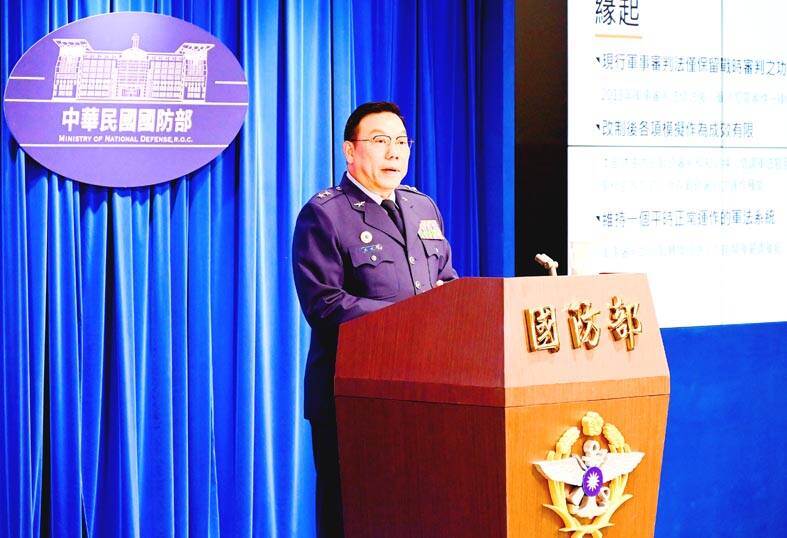President William Lai’s (賴清德) proposal to reinstate military courts could be a boon to legal efficiency and discipline, a former military judicator said yesterday.
Lawyer Chen Chia-hung (陳佳鴻), formerly an armed forces judicator, said that military tribunals might relieve civilian courts of backlogged cases by swiftly dealing with breaches of military law cases.
That would allow speedy and proper trials for cases that would otherwise undermine the discipline and image of the armed forces, he said.

Photo: Chu Pei-hsiung, Taipei Times
Military justice requires a balance between human rights, and maintaining discipline and hierarchy, Chen said.
Military courts would likely hand down harsher sentences to deter service members from spying for China or straying from discipline, he said.
A prosecutor who specializes in dealing with military cases said that members of the judiciary often showed a lack of understanding in the requirements of discipline and leadership, which has led to calls for the restoration of military courts.
Former judicators without practical experience have trouble keeping up with changes in technology, which affect their ability to investigate crimes, such as the use of cryptocurrency in spying, they added.
Experts have called for military judicators to join civil benches to make the transition from peacetime to wartime easier.
Speaking at a conference last year, Lieutenant-General Shen Shih-wei (沈世偉), head of the Ministry of National Defense’s Judicial Department, expressed doubts about Taiwan’s ability to maintain military justice during war.
Taiwan’s current system, which envisions transitioning from civilian courts to military tribunals, would depend on the performance and skill of military jurists who do not have practical trial experience, he said, adding that the discipline that is meted out during wartime is different.
A military version of civilian administrative courts, restoring military prosecutors, involving judicators in cases concerning the armed forces’ code of conduct and establishing one to two tiers of military tribunals might help retain legal expertise in the military, Shen said.
Institute for National Defense and Security Research (INDSR) assistant research fellow Jiang Hsin-biao (江炘杓) said that holding collegiate bench courts composed of judges and judicators could prove useful in building legal experience.
Courts that are made up entirely of military jurists cannot be re-established, as their function was transferred to civilian courts, he said.
INDSR assistant research fellow Yang Chang-jong (楊長蓉) said that looking at other nations, a mixed bench of civilians and judicators could be a viable solution.
Armed forces personnel could act as advisers to civilian courts in trials that involve breaches of military law, but they would not have the power to render a judgement, she said.

Alain Robert, known as the "French Spider-Man," praised Alex Honnold as exceptionally well-prepared after the US climber completed a free solo ascent of Taipei 101 yesterday. Robert said Honnold's ascent of the 508m-tall skyscraper in just more than one-and-a-half hours without using safety ropes or equipment was a remarkable achievement. "This is my life," he said in an interview conducted in French, adding that he liked the feeling of being "on the edge of danger." The 63-year-old Frenchman climbed Taipei 101 using ropes in December 2004, taking about four hours to reach the top. On a one-to-10 scale of difficulty, Robert said Taipei 101

Taiwanese and US defense groups are collaborating to introduce deployable, semi-autonomous manufacturing systems for drones and components in a boost to the nation’s supply chain resilience. Taiwan’s G-Tech Optroelectronics Corp subsidiary GTOC and the US’ Aerkomm Inc on Friday announced an agreement with fellow US-based Firestorm Lab to adopt the latter’s xCell, a technology featuring 3D printers fitted in 6.1m container units. The systems enable aerial platforms and parts to be produced in high volumes from dispersed nodes capable of rapid redeployment, to minimize the risk of enemy strikes and to meet field requirements, they said. Firestorm chief technology officer Ian Muceus said

MORE FALL: An investigation into one of Xi’s key cronies, part of a broader ‘anti-corruption’ drive, indicates that he might have a deep distrust in the military, an expert said China’s latest military purge underscores systemic risks in its shift from collective leadership to sole rule under Chinese President Xi Jinping (習近平), and could disrupt its chain of command and military capabilities, a national security official said yesterday. If decisionmaking within the Chinese Communist Party has become “irrational” under one-man rule, the Taiwan Strait and the regional situation must be approached with extreme caution, given unforeseen risks, they added. The anonymous official made the remarks as China’s Central Military Commission Vice Chairman Zhang Youxia (張又俠) and Joint Staff Department Chief of Staff Liu Zhenli (劉振立) were reportedly being investigated for suspected “serious

American climber Alex Honnold is to attempt a free climb of Taipei 101 today at 9am, with traffic closures around the skyscraper. To accommodate the climb attempt and filming, the Taipei Department of Transportation said traffic controls would be enforced around the Taipei 101 area. If weather conditions delay the climb, the restrictions would be pushed back to tomorrow. Traffic controls would be in place today from 7am to 11am around the Taipei 101 area, the department said. Songzhi Road would be fully closed in both directions between Songlian Road and Xinyi Road Sec 5, it said, adding that bidirectional traffic controls would